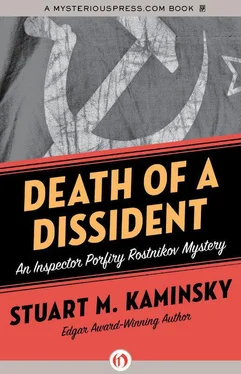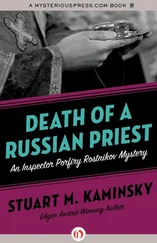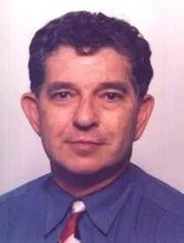Stuart Kaminsky - Death of a Dissident
Здесь есть возможность читать онлайн «Stuart Kaminsky - Death of a Dissident» весь текст электронной книги совершенно бесплатно (целиком полную версию без сокращений). В некоторых случаях можно слушать аудио, скачать через торрент в формате fb2 и присутствует краткое содержание. Год выпуска: 2012, ISBN: 2012, Жанр: Полицейский детектив, на английском языке. Описание произведения, (предисловие) а так же отзывы посетителей доступны на портале библиотеки ЛибКат.
- Название:Death of a Dissident
- Автор:
- Жанр:
- Год:2012
- ISBN:9781453266298
- Рейтинг книги:4 / 5. Голосов: 1
-
Избранное:Добавить в избранное
- Отзывы:
-
Ваша оценка:
- 80
- 1
- 2
- 3
- 4
- 5
Death of a Dissident: краткое содержание, описание и аннотация
Предлагаем к чтению аннотацию, описание, краткое содержание или предисловие (зависит от того, что написал сам автор книги «Death of a Dissident»). Если вы не нашли необходимую информацию о книге — напишите в комментариях, мы постараемся отыскать её.
Death of a Dissident — читать онлайн бесплатно полную книгу (весь текст) целиком
Ниже представлен текст книги, разбитый по страницам. Система сохранения места последней прочитанной страницы, позволяет с удобством читать онлайн бесплатно книгу «Death of a Dissident», без необходимости каждый раз заново искать на чём Вы остановились. Поставьте закладку, и сможете в любой момент перейти на страницу, на которой закончили чтение.
Интервал:
Закладка:
Tkach’s confusion was enormous, as was the call of his bladder. No one had ever spoken to him like this. Everyone feared the police.
“Would you rather I have you brought to Petrovka for questioning?” Tkach tried.
Lvov shrugged and smiled.
“If it pleases you,” he said, filling his pipe and searching for a match. “You will get no more. The problem, young man, is that you can no longer threaten a man who has nothing to lose. I am old. I am sick and possibly dying. I am not permitted to work, and I have no family. What will you take from me, my pipe?” And with this question, Lvov threw the pipe against the wall. Pieces of tobacco rained out and Tkach watched the old man’s shoulders sag.
He went out the door closing it softly behind him.
“The toilet is at the end of the hall,” Lvov’s voice came through the thin door.
It was slightly after noon when Tkach made his way back to Petrovka, which was alive with activity. People with briefcases hurried past, arguing. Dirty men in near rags being hurried along. Shouts heard through thick doors. A typical day for the police. The building restored Sasha Tkach’s confidence, which had been shaken by his experience of the morning.
When Tkach entered the inspector’s small office at the end of the large bustling room full of detectives, Rostnikov whispered, “Close the door behind you.” Karpo was sitting in one of the two chairs, holding the sickle in his hand. Tkach closed the door behind him and took off his coat, eager for information.
“Something’s broken?” he asked.
“No,” said Rostnikov. “I want to eat the pirozhki I bought on the way back.” And with that, he pulled a brown paper bundle from his desk drawer and unwrapped it. “Would you care for some?”
Karpo didn’t bother to respond. Tkach hesitated.
“Take it,” sighed Rostnikov. “It’s more than I should have.”
Tkach took the sandwich and began to eat.
Karpo reported first. The sickle was a kind no longer manufactured, one made sixty years ago by a small company in Tula. Used by small farms. No fingerprints. Nothing.
Tkach, between bites, reported his failure with Lvov; he left out the parable, most of the verbal exchange and the information about his weak bladder. He also reported on similarly fruitless interviews with four other friends of Granovsky.
“One thing,” Tkach added. “As much as they refused to talk, they felt compelled to tell how much they disliked Granovsky as a man. His enemies were not just political. I have eight more names on the primary list. If I exhaust that, perhaps I can get more leads.”
There was little room to maneuver in the small office, and it had no sense of home or comfort. There were no pictures on the walls. The desk was clear except for a wooden box piled high with reports and memos. There was no privacy either. The walls were thin and confidence was kept only by whispering.
Rostnikov finished his sandwich and wiped crumbs onto the floor.
“And?” he asked.
Tkach chewed, hesitated.
“Nothing,” he said taking another bite.
“And what is nothing?” Rostnikov persisted.
“These people are clever,” the young man finally said trying not to look at Karpo. “They use words better…It might be a good idea to put someone else on this part of the investigation. I’m not afraid of it, but someone more…more able in this line might obtain more.”
“You are not out there to outthink them, but to seduce them with your apparent innocence,” Rostnikov said. He let out an enormous belch of satisfaction. “You let them talk, let them be clever, let them think you a fool. They will say more to prove their superiority than a clever man could get from them in combat. What do you think, Karpo?”
“We use what we have,” agreed Karpo. “You must learn to use what you have.”
“And I,” said Rostnikov, folding his hands on his belly, “had the privilege to interview a true fool. Tell me, Karpo, did you think the K.G.B. had any fools as agents?”
Karpo’s eyes turned from the sickle to the raised brown eyes of the inspector.
“It is not impossible,” Karpo admitted. “There are sometimes political reasons there as there are here. It is curious, but the K.G.B. is composed of men. Men are animals. Animals are not perfect. We can only strive.”
“Yes,” agreed Rostnikov, “but some of us can try harder than others, can they not?”
Karpo shrugged.
Once each month, time and duty permitting, Emil Karpo, the Tatar, the vampire, made a pilgrimage to a small café off Gorky Street. In that bar, he met Matilde, a part-time prostitute, part-time telephone operator. It was the only illegal act Emil Karpo engaged in, and he explained it to himself as the only imperfection he could not fully control in his body. A small part of him remained animal. It disturbed him, but he had learned to accept it. What he did not know was that Porfiry Rostnikov was well aware of his monthly outing and fully approved of this “weakness.” If it weren’t for this vulnerability, Rostnikov was sure he would have been unable to work with Karpo. He could not stand saints of any religion. Without weakness, man might no longer be an animal, but he would come close to being a robot.
There were places to go, things to do. Rostnikov would now have to make a report to Procurator Timofeyeva, and the slow-moving investigation would have to move more quickly. And then the door to the small room burst open.
Officer Yuri Grishin, a distant relative of a high official in the Moscow police, put his head in the door. It was a huge head with a face that looked as if a wall had fallen on it, but it was the family face.
“I’m sorry Inspector, but Ludmilla said I should break in and tell you. The vodka hijackers Tkach has been after. They’ve been cornered at a government store on Zvenigorod near the Byelorussian Railway Terminal.”
Rostnikov and Tkach exchanged glances.
“Go,” said Rostnikov, and Tkach rose quickly throwing on his coat.
“I would like to go too,” said Karpo, placing the sickle on the desk before Rostnikov.
Tkach paused, trying to think of something to say.
“Go,” sighed Rostnikov. “Go. In two hours, no more, you are to be back here and prepared to work through the night, both of you.” The two junior officers left the office, and Rostnikov picked up the sickle. He looked at it, smelled it, whispered to it, cursed it, and it told him nothing. Somewhere out there was a man who could-and almost certainly would-kill again, a man who had become an animal.
Rostnikov had a sudden vision of his son Iosef and imagined him being attacked by a trio of robed Arabs carrying broken bottles and rusty sickles. To destroy the image, Rostnikov swung the sickle over his head and into the desk. Instead of sinking into the wood, it skittered along the top, making a deep scratch. At the end of the top of the desk, the sickle caught the phone and the tip of the blade broke off. There are days, thought Rostnikov, where fate denies a man even the most meaningless of dramatic gestures.
The snow had fallen all through the morning and was still falling when Karpo and Tkach got out of the Volga on Zvenigorod. To Tkach, the scene seemed to be played through gauze. There were vague outlines of brown-clad police with Tete guns pointed across the broad street at an old three-story building which Tkach could barely make out. There seemed to be no life on the street. If people were curious, they were not curious enough to be in range of policemen with Tete guns at the ready. It was a sleepy image of near night though the day was still with them. Tkach knew that traffic had to be rerouted on the streets around, and in the distance he could hear the angry honking of horns, a sound frowned upon and officially forbidden, as forbidden as it was to drive a dirty car in Moscow, though such things were occasionally seen.
Читать дальшеИнтервал:
Закладка:
Похожие книги на «Death of a Dissident»
Представляем Вашему вниманию похожие книги на «Death of a Dissident» списком для выбора. Мы отобрали схожую по названию и смыслу литературу в надежде предоставить читателям больше вариантов отыскать новые, интересные, ещё непрочитанные произведения.
Обсуждение, отзывы о книге «Death of a Dissident» и просто собственные мнения читателей. Оставьте ваши комментарии, напишите, что Вы думаете о произведении, его смысле или главных героях. Укажите что конкретно понравилось, а что нет, и почему Вы так считаете.












